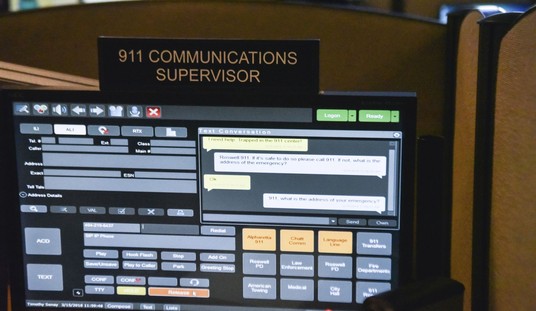Much of the discussion at the 2013 Defending the American Dream summit in Orlando, Florida concerned the importance of cultural engagement. Bill Whittle gave a riotously funny, but also very thoughtful, speech about the difficulty of doing battle with a popular culture that portrays some element of the conservative movement or Republican Party as the villain in every story and song.
Senator Ted Cruz (R-TX) also made a cultural reference, beginning with a joke about how the Obama White House would regard “Duck Dynasty” as a horror show. After mulling over Cruz’ speech for a while, I concluded he was using “Duck Dynasty” as the entrance point for a much larger discussion, not just about pop culture, but the culture of work.
That’s a culture under full-scale assault these days. One of the core assumptions of Obama-style technocratic government is that private businesses, customers, and employees cannot be trusted to engage in commerce with each other. The benevolent State must oversee every transaction, from paychecks to purchases. People have been taught to hate and fear their employers, who are portrayed in Obama mythology as heartless predators, scarcely aware of the hapless Little People they gobble up in their quest for outrageous wealth. (“You didn’t build that! Someone else made that happen!”)
In truth, Cruz pointed out, the real divide is between predatory government and its dependents – many of whom are millionaires – versus a rapidly dwindling private-sector working America. The people who cash paychecks should not allow themselves to be manipulated into hating the people who write them. They have a lot more in common than leftist pop culture likes to acknowledge.
I’ve always encouraged young people to think of themselves as salesmen for their own labor. It puts the relationship between employers and employees in the proper context. The subject came up when I was talking with some young people about the “living wage” movement, which has various manifestations – most recently a big strike by fast-food employees; before that, an effort by the D.C. city council to mandate higher wages for Wal-Mart workers. In essence, the “living wage” thing is a crusade to effectively double the current minimum wage, in one big leap, using some combination of government force and protest-group pressure.
We should view ourselves as a nation of salesmen and saleswomen. The salesman’s job is persuasive. He cannot force customers to buy his products. He must compete for their business. Sometimes he competes by offering a lower price, sometimes by offering higher quality. He always wants the highest price he can obtain for his goods. He’s also well aware of his role as a customer, buying raw materials and finished products from his suppliers. When he buys, he wants to pay the lowest price he can possibly arrange.
The successful salesman is keenly aware of the value of his inventory. How else could he set an attractive price for his wares, without cutting too deep into his profit margins? A car salesman couldn’t stay in business without knowing the value of the cars he sells – both their perceived value to customers, and the actual price he paid to acquire them.
Every working person is a salesman for his own labor. It’s a product we sell to our employers. It requires a substantial investment of time and money for us to develop that product, enhancing its value through education and work experience. We should develop a good appreciation for the true value of our labor, if we want to sell it effectively at a profit.
The true value of labor is not increased by artificially inflating is price. This is something the “living wage” crowd either does not understand, or refuses to accept. A fast-food employee’s labor is not suddenly worth $15 per hour, just because a law forces restaurants to pay $15 for it. Artificially inflating price tends to reduce demand – employers will find ways to get by with fewer employees.
And while we’re on the subject of understanding the value of your labor, you should immediately abandon the curious fantasy that your gross wages are the true cost of your labor. It’s much higher than that. Your employer pays many mandatory taxes and fees, in addition to optional benefits. The value of your vacation, holiday, and sick time must be factored into your annual cost. If the “living wage” movement succeeded in imposing a $15 minimum wage on fast food jobs, the true hourly cost of those employees would be much closer to $30, depending on which state the restaurant was located in.
Computing a realistic profit margin is a big part of sales. It’s no different when you sell your labor on the open market. If your pay and benefit expectations are too high, you’ll have trouble finding buyers. It might seem odd to speak of selling labor for a “profit,” because we have no choice but to sell it – we can’t just sit on the inventory, can we? But of course, in Food Stamp Nation we can. It is quite possible to survive for very long periods of time, or even indefinitely, without working. There is an opportunity cost to selling your labor. You could do plenty of other things with the hours you sell – activities you find more enjoyable or personally fulfilling. The urgency of making a sale is diminished when productive labor becomes a lifestyle choice. Buyers understand this, and adjust their expectations accordingly.
Customer service is important to every good salesman. You should regard your employer as the customer who purchases your labor. They’re looking for the same sort of cheerful service you are, when you cruise into a department store to buy some clothes. Employment is a voluntary arrangement that either side may terminate, if they find it unsatisfactory. Your task is to make the employer believe that a long-term business relationship with you is in their best interest. And you must understand that the early days of that relationship will probably involve more cost than benefit to the employer – they’ve got to train you for your position, you have to develop a relationship with your co-workers, you must learn all the fine details of the operation, and so forth. You want prospective employers to see you as a wise investment, not a risky gamble.
Let’s be blunt: you’re selling your labor in a highly competitive environment. There are usually lots of other people eager to steal those employer-customers from you. Even after you have been hired, you are still selling yourself as a candidate for promotions and salary increases. You should want the flexibility to compete on both price and quality. You want to prove that you’re worth more than your initial salary – which is very difficult to do when the mandated minimum wage is very high. That tends to produce an environment in which a small number of people are hired, but huge minimal requirements are placed upon them, and it’s more difficult to demonstrate excellence.
Every salesman wants to face a large customer base clamoring to purchase his product, not a small pool of picky customers who have good reasons to talk themselves out of making a purchase. The entry-level part of a healthy job market should be drawing a high percentage of available workers into the market, giving them valuable work experience that allows them to seek better positions. And of course, there must be better positions on offer. Instead, we’re looking at a collapsed workforce with a growing population of “unemployables” – people who just can’t seem to find work, and whose long-term unemployment makes their labor increasingly difficult to sell (as well as making them weary of futile efforts to sell it.) Picky customers are buying only the highest-quality labor with the best track record of performance, rather than taking chances on the inexperienced. It’s tough for a young salesman to crack a market like that with a new, untested product.
The culture of work is all about having a nation of salesmen, enthusiastically buying and selling from each other. A high volume of voluntary commerce is inseparable from a high level of personal liberty. Only free people can choose to buy and sell. Only free buyers inspire providers to engage in productive competition to attract their business. Popular culture, politicized by the Left, seems quite antithetical to the culture of work that free people should vigorously celebrate, every single day, most definitely including Labor Day.












Join the conversation as a VIP Member